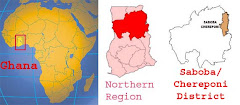After three weeks at work my task has been laid out for me. Since starting work on March 19, I have been helping out in the office on various projects, as well as attending meetings and workshops to find out just how the District Assembly works. Through the small work I have done and informal conversations with co-workers and supervisors, I have generated a fairly good idea of the problems here at the District Assembly and have now started to address these issues.
I will start by giving some background into the governmental set up of Ghana. Right now I am working at the district level of government. Ghana is divided into regions (the equivalent of our provinces) and then into districts. The District Assembly is responsible for all development projects in its district. Any Non-governmental organizations (NGO) working in the district must first get permission form the District Assembly, and usually end up cooperating with the local government. As well, money from the national level of government is allocated to each District Assembly so that it can deliver services to its people.
In essence I am here to serve two functions. To provide an extra set of hands in any given development project to help services get out quicker and improve the quality of services to the rural poor. The second is to act as a consultant to this government structure, and strengthen its institutional capacity so that it can perform better in my absence.
GAP FILLING
This is the part of my work where I am just working on any given project to help move things along, and also learn about how the District Assembly works and how to improve it. So far this has been anything from helping with report writing, to monitoring and evaluation of previous projects, to developing ranking criteria for citing projects.
CONSULTANCY
The following tasks were identified by my boss and myself upon observing some of the bottlenecks here at the district.
1) The evaluation of the four year medium term plan. Every district creates a four year medium term development plan which determines all of the projects they will do for the following 4 years. This plan is also supposed to be monitored as it goes, which has been done to some extent but could be improved upon. My job is to actually look at the medium term development plan and see how much has been completed, and most importantly, what we can learn from what we've done, etc.
2) While doing the evaluation of the four year medium term plan, we will also gather the community’s needs, priorities, and suggestions. From all this information we will make the new development plan for the two new districts (the district I was originally posted two has split into two).
3) Through both of these activities I am to resuscitate the district planning and co-ordinating unit. This committee of people is responsible for all the planning and decision making with regards to any development projects in the district. My boss strongly feels that improvement in this area could really improve the effectiveness of the District Assembly.
4) Creating a better information management system. Ensuring that key information is gathered, organized and stored efficiently so that decisions can be made based on evidence.
5) Computer training of the staff.
That is my work in brief. I wish there was a way to boil it down into a simpler picture, but as I have come to learn, the development industry is convoluted mess of different players and activities that makes it difficult to wrap your brain around at first.


